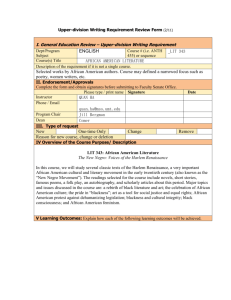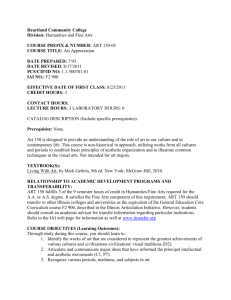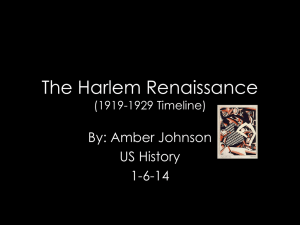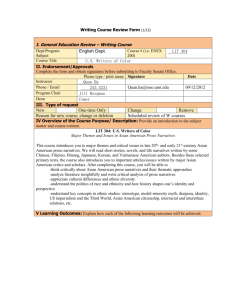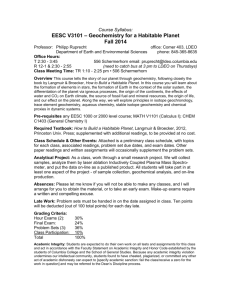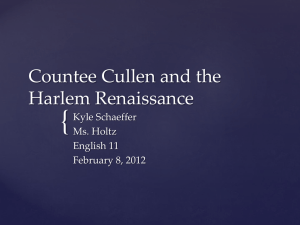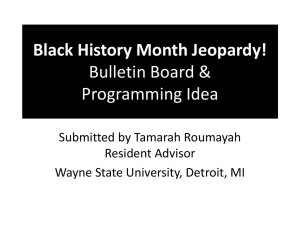I. General Education Review – Writing Course
advertisement
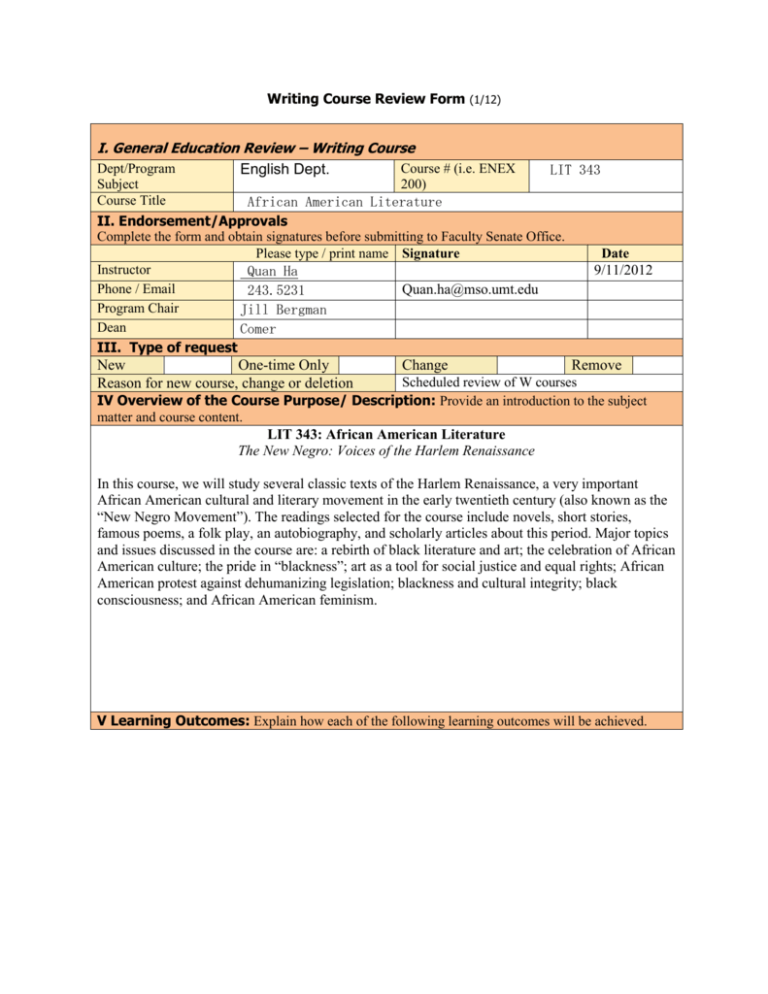
Writing Course Review Form (1/12) I. General Education Review – Writing Course Dept/Program Course # (i.e. ENEX English Dept. LIT 343 Subject 200) Course Title African American Literature II. Endorsement/Approvals Complete the form and obtain signatures before submitting to Faculty Senate Office. Please type / print name Signature Date Instructor 9/11/2012 Quan Ha Phone / Email Quan.ha@mso.umt.edu 243.5231 Program Chair Jill Bergman Dean Comer III. Type of request New One-time Only Reason for new course, change or deletion Change Remove Scheduled review of W courses IV Overview of the Course Purpose/ Description: Provide an introduction to the subject matter and course content. LIT 343: African American Literature The New Negro: Voices of the Harlem Renaissance In this course, we will study several classic texts of the Harlem Renaissance, a very important African American cultural and literary movement in the early twentieth century (also known as the “New Negro Movement”). The readings selected for the course include novels, short stories, famous poems, a folk play, an autobiography, and scholarly articles about this period. Major topics and issues discussed in the course are: a rebirth of black literature and art; the celebration of African American culture; the pride in “blackness”; art as a tool for social justice and equal rights; African American protest against dehumanizing legislation; blackness and cultural integrity; black consciousness; and African American feminism. V Learning Outcomes: Explain how each of the following learning outcomes will be achieved. Student learning outcomes : Use writing to learn and synthesize new concepts Formulate and express written opinions and ideas that are developed, logical, and organized Compose written documents that are appropriate for a given audience, purpose and context Revise written work based on constructive comments from the instructor Find, evaluate, and use information effectively and ethically (see http://www.lib.umt.edu/informationliteracy/) Begin to use discipline-specific writing conventions Demonstrate appropriate English language usage VI. Writing Course Requirements Enrollment is capped at 25 students. If not, list maximum course enrollment. Explain how outcomes will be adequately met for this number of students. Justify the request for variance. What instructional methods will be used to teach students to write for specific audiences, purposes, and genres? Students are required to write two major research essays (7 pages/essay), in which they present an argument and integrate research into their critical interpretation/analysis of a literary text. The two in-class exams ask students to write a 250-word paragraph to answer each exam question. There are 5 questions in each exam, which requires students to formulate their thoughts logically in a time-constrained environment and tests their ability to articulate their thoughts succinctly within a paragraph. Each essay must follow the formal format of an academic paper. Students must be able to state a strong argumentative thesis statement strongly, write solid topic sentences, and develop coherent paragraphs while maintaining the coherence and unity of the essay as a whole. Specific examples and evidence are required to reinforce their argument. Both essays and exam answers must use formal, standard English. The audience is assumed to be an academic person familiar with the field. Students have one week, after they receive their essays back, to revise their works based on the instructor’s feedback. Students must familiarize themselves with scholarly, academic, and reliable sources. Their research sources must be books in print or articles accessed via the Library’s databases. Legal actions will be taken against plagiarism. Students must follow the MLA style for grammar usage, punctuation conventions, documentations and citations. Standard modern American English and proper mechanics. Each student is required to meet with the instructor at least a week before a paper is due to discuss a possible topic and an outline for his/her essay. Then, he/she is required to meet with the instructor again to go over the strengths and weaknesses of his/her essay in the instructor’s office. Students are suggested to consult handbooks on academic writing to learn about the writing conventions. In their face-to-face meetings with the instructor, he will discuss his expectations and suggest books that students should consult to overcome their writing weaknesses. Which written assignments will include revision in There will be two required revisions for the response to instructor’s feedback? two formal essays. No grade will be assigned until the revisions are turned in. VII. Writing Assignments: Please describe course assignments. Students should be required to individually compose at least 16 pages of writing for assessment. At least 50% of the course grade should be based on students’ performance on writing assignments. Clear expression, quality, and accuracy of content are considered an integral part of the grade on any writing assignment. Formal Graded Assignments 70% Informal Ungraded Assignments 30% VIII. Syllabus: Paste syllabus below or attach and send digital copy with form. For assistance on syllabus preparation see: http://teaching.berkeley.edu/bgd/syllabus.html The syllabus must include the following: 1. Writing outcomes 2. Information literacy expectations 3. Detailed requirements for all writing assignments or append writing assignment instructions Paste syllabus here. FALL 2012 LIT 343: African American Literature The New Negro: Voices of the Harlem Renaissance Instructor: Dr. Quan M. Ha Office hours: Tues & Thurs 10:00-11:00 AM & 1:00-2:00 PM Class meetings: Tues & Thurs 2:10-3:30 PM E-mail: quan.ha@mso.umt.edu Office: LA 213 Classroom: LA 306 Course Description In this course, we will study several classic texts of the Harlem Renaissance, a very important African American cultural and literary movement in the early twentieth century (also known as the “New Negro Movement”). The readings selected for the course include novels, short stories, famous poems, a folk play, an autobiography, and scholarly articles about this period. Major topics and issues discussed in the course are: a rebirth of black literature and art; the celebration of African American culture; the pride in “blackness”; art as a tool for social justice and equal rights; African American protest against dehumanizing legislation; blackness and cultural integrity; black consciousness; and African American feminism. Expected Outcomes -think critically about African American prose narratives, poetry, and drama, and their thematic approaches -analyze literature insightfully and write critical analysis of prose narratives -appreciate cultural differences and ethnic diversity -understand the politics of race and ethnicity and how history shapes one’s identity and perspective -understand key concepts in ethnic studies: stereotype, identity, interracial and interethnic relations, racial pride, etc. 7 Required Texts William L. Andrews, ed., Classic Fiction of the Harlem Renaissance. ISBN: 978-0195081961. Langston Hughes, Not without Laughter. ISBN: 978-0486454481. George S. Schuyler, Black No More. ISBN: 978-0486480404. James Weldon Johnson, The Autobiography of an Ex-Colored Man. ISBN: 978-0486285122. Wallace Thurman, The Blacker the Berry. ISBN: 978-0486461342 Jessie Redmon Fauset, Plum Bun. ISBN: 978-0807009192 LIT 343 Coursepack Classroom policies 1. You are not allowed to read newspapers or class-unrelated materials while class is in session. 2. The use of cell phones, beepers, or other electronic devices is prohibited during class. 3. Any persistent talking or sleeping while the instructor or another student is speaking will result in (1) a warning and (2) then your dismissal from the classroom. 4. You are permitted to use laptops during class for note-taking and other class-related work only. 5. Behave in a courteous and respectful manner toward your instructor and your fellow students. E-mail correspondence Use your UM e-mail account for electronic correspondence with the instructor. You may expect my response within 48 hours (except weekends and holidays). I expect you to use a professional tone in your correspondence with me. E-mails that have no greeting or express a disrespectful tone will not be answered. Attendance and Tardiness 1. Tardiness of between 5 and 10 minutes will be noted: each such tardiness after the first two will be counted as an unexcused absence; tardiness of 20 minutes or longer will be treated as an unexcused absence. 2. If you have to leave class early due to personal problems, inform me before class starts. 3. You are allowed TWO free absences. After your second unexcused absence, 20 points will be deducted for each additional absence. More than 4 unexcused absences will result in the failure of the course. 4. If you miss no class, I will add 10 bonus points to your final grade. 5. Make-up quizzes are for excused absences only. Assignments TWO FORMAL ESSAYS (1,600-1,700 words/essay): Specific instructions to be announced. ONE ORAL PRESENTATION: You will prepare 8-10 questions for class discussion over the readings you have been assigned. Make 15 copies of your questions and bring them to class for distribution. TWO EXAMS (in class): Specific instructions to be announced READING QUIZZES: At the beginning of each class meeting, you will take a reading quiz. Grades Grades will be assigned as percentage scores (0-1000) throughout the term. Ultimately, your final grade will be converted to the university’s letter grade system using this scale: A+ (970-1000) B+ (870-899) C+ (770-799) D (650-699) A (940-960) B (840-860) C (740-760) F (640 or below) A- (900-930) B- (800-830) C- (700-730) Reading quizzes------------------------------ -------------------------------------200 points Two major essays-------------------------------------------------------------------- 500 points (250 points/each) Two exams--------------------------------------------------------------------------200 points (100 points/each) Oral presentation--------------------------------------------------------------------- 50 points Active participation in class discussion-----------------------------------------50 points TOTAL: 1,000 points Policies on written assignments and in-class tests 1. Late papers will be penalized with a 10% deduction for each day after the due date, including weekend days. If extenuating circumstances prevent you from turning in a paper on time, please talk to me BEFORE the paper is due. I am not likely to make allowances after the deadline has come and gone. 2. All papers are to be typed in 12-point font, Times New Roman, double-spaced. Follow the MLA guidelines for formatting, citations, and documentations. 3. For each formal essay, you must enter my corrections and turn in the revised version. Failing to do this will result in a zero on the assignment. 4. Do not ask me to proofread your essays electronically (via email). If you need help with your papers, please schedule an appointment, or just come during my office hours. 5. Under no circumstance will I offer make-up tests/exams. Grade Appeals If you wish to appeal a grade, you should first consult with me. You will have 4 days, from the time the grade is assigned/posted, to set up an appointment with me to discuss the grade. After 4 days, all grades are final. Accommodations Students with disabilities will receive reasonable accommodations for coursework. To request accommodation, please contact me as soon as possible in the semester. I will work with you and Disability Services in the accommodation process. For more information, visit the Disability Services website at http://www.umt.edu/dss/ or call 406.243.2243 (Voice/Text). Academic Integrity Refer to http://life.umt.edu/VPSA/Student_Conduct.php. for information about academic misconduct. If you are found guilty of academic misconduct, legal action will be taken. It is your responsibility as a student to understand the Student Conduct Code described in the link above. Reading Schedule (subject to change) Week 1: Aug. 27—Sept. 2 Tues: Introduction & syllabus Thurs: Zora N. Hurston, in Classic Fiction of the HR (pp. 75-100) COREY W. Week 2: Sept. 3—9 Tues: Jean Toomer, in Classic Fiction of the HR (pp. 15-37) DAN NELSON Thurs: Hughes, Not Without Laughter (pp. 1-111) ISAAC I. Week 3: Sept. 10—16 Tues: Hughes, Not Without Laughter (pp. 112-end) AMANDA S. Thurs: Rudolph Fisher + Langston Hughes, in Classic Fiction of the HR (pp. 239-253 & pp. 363379) VERONIKA Week 4: Sept. 17—23 Tues: Locke’s “Enter the New Negro” + Poems 1 & 2 in Coursepack MORGAN L. Thurs: Schuyler, Black No More (pp. 1-75) JENNA F. Week 5: Sept. 24—30 Tues: Schuyler, Black No More (pp. 76-end) TYLER T. Thurs: Poems 3 + 4 + 5 in Coursepack JEFFREY J. Week 6: Oct. 1—7 Tues: McKay, Home to Harlem, in Classic Fiction of the HR (pp. 101-177) Thurs: McKay, Home to Harlem (178-237) VICTORIA G. LANDON L. Week 7: Oct. 8—14 ****** Tues: Mid-term Exam Thurs: Keller’s “The Harlem Literary Renaissance” + Baker’s “Modernism and the Harlem Renaissance” + Hart’s “Black-White Literary Relations in the Harlem Renaissance” in Coursepack IRVAN B. Week 8: Oct. 15—21 ****** Essay # 1 due, 11:00 AM, Monday, Oct. 15, my office Tues: Johnson, The Autobiography of an Ex-Colored Man (pp. 1-60) Thurs: Johnson, The Autobiography of an Ex-Colored Man (pp. 61-end) Week 9: Oct. 22—28 ROSE D. JANELLE S. Tues: Gayle’s “The Harlem Renaissance: Towards a Black Aesthetic” in Coursepack + Toomer’s “Kapnis” in Classic Fiction of the HR (pp. 38-73) ELISA N. Thurs: Fauset’s “The Gift of Laughter” + Richardson’s Compromise in Coursepack SOPHIE O. Week 10: Oct. 29—Nov. 4 Tues: Poems 7 + 8 + 9 in Coursepack ROBIN Z. Thurs: Fauset’s Plum Bun (pp. 1-172) SUZANNE F. Week 11: Nov. 5—11 Tues: Election Day / No Class Thurs: Fauset’s Plum Bun (pp. 173-end) TORIE P. Week 12: Nov. 12—18 Tues: Larsen, Quicksand, in Classic Fiction of the HR (pp. 255-361) ANNA-MARIE B. Thurs: Holmes’s “Alain Locke and the New Negro Movement” + Braithwaite’s “The Negro in American Literature” in Coursepack BRITNI E. Week 13: Nov. 19—25 Tues: Individual meetings with students (no reading assigned) ****** Essay # 2 due (5:00 PM, Tues., Nov. 20, in my office) Thurs: Thanksgiving/No Class Week 14: Nov. 26—Dec. 2 Tues: Mason’s “Alain Locke on Race and Race Relations” + Braithwaite’s “Alain Locke's Relationship to the Negro in American Literature” in Coursepack ANNA Z. Thurs: Thurman, The Blacker the Berry (pp. 1-84) HANNAH C. Week 15: Dec. 3—9 Tues: Thurman, The Blacker the Berry (pp. 85-end) Thurs: Poems 10 + 11 + 12 + 13 (last day of class) ****** Final Exam: TBA JONATHAN H. REBBECA S.

